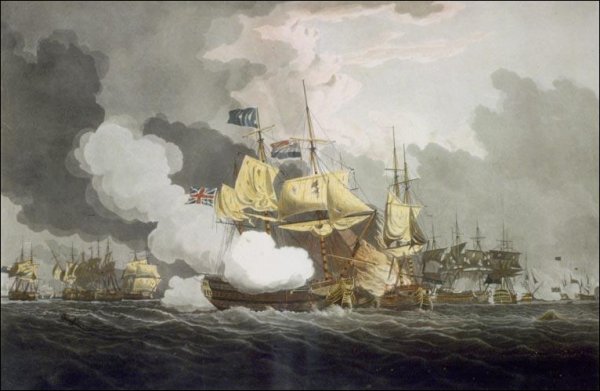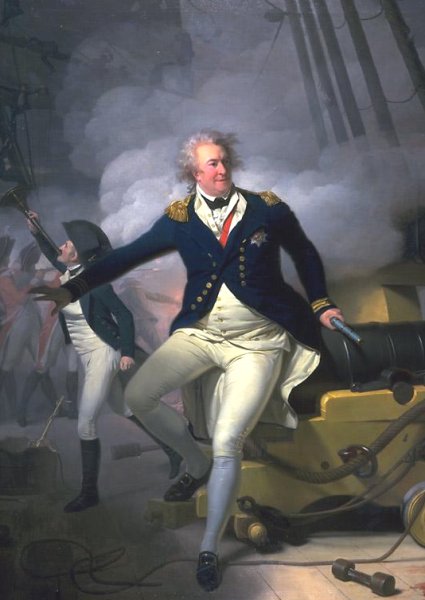|
On
October 11th 1797, Admiral Duncan's North Sea Fleet of 18 vessels
trounced the Dutch fleet of 23 warships at Camperdown.
The
64 gun Ardent under Captain Richard Burgess was the first
to engage the enemy flagship the Vrijheid. After 3 hours
of ferocious fighting the Captain of the Ardent lay dead, together
with 40 of his crew. A further 96 had been dreadfully mangled by
the Vrijheid's broadsides.
One
of the survivors of the Ardent was a 22 year old Able Seaman by
the name of David Gray. When the Ardent put into Chatham 3 months
later, Gray deserted and fled to South shields where he joined a
whaler. This was the start of Captain David Gray's illustrious career
as a whaler and also of a great Peterhead whaling dynasty.
 ©SCRAN/Dundee City Council
©SCRAN/Dundee City Council
Defeat of the Dutch Fleet by J W Edy .
|
The
engraving concentrates on the two flagships - the Venerable
and the Vrijheid - in the midst of battle. The Vrijheid
is badly damaged and close to surrendering and the Hercules
alongside her is burning. The time of battle is about 3pm. All the
ships depicted are named from left to right; Gelykheid, Monarch,
Wassenaar, Jupiter, Russel, Harlem, Powerful, Venerable, Vrijheid,
Hercules, Cerberus, Ardent, Batavier,
Brutus, Leyden, Belliqueux.
Admiral
Adam Duncan, 1st Viscount Duncan of Camperdown, came from a family
of pro-Hanoverian Scots. His father, a local landowner, was Provost
of Dundee before and after the Rising of 1745 and the next generation
all pursued careers in the service of the crown.
He
served under Admiral Keppel off Africa and the West Indies in his
twenties and thirties, and, recalled to active service in 1778,
saw action with Admirals Rodney and Howe. During peacetime he lived
as an Edinburgh gentleman and made a useful marriage to Henrietta
Dundas whose uncle became Pitt's secretary of state for war in 1794.
Until
1796 Duncan's career was worthy rather than remarkable, but during
his last posting, he emerged, spectacularly, as one of Britain's
great naval heroes. To counter the threat of aggression from the
newly created Dutch Republic during the war against France, a North
Sea fleet had been formed with Duncan at its command. After successfully
blockading the Dutch fleet he led his ships to victory off the Dutch
coast on 11 October 1797. This victory was significant both practically
- the threat of a French invasion now faded - and symbolically,
as a huge morale boost after years of inconclusive engagements and
domestic discontent. It also marked the end of the Dutch Greenland
whaling industry.

©SCRAN/National galleries of Scotland
Admiral
Adam Duncan, 1st Viscount Duncan of Camperdown.
|
|